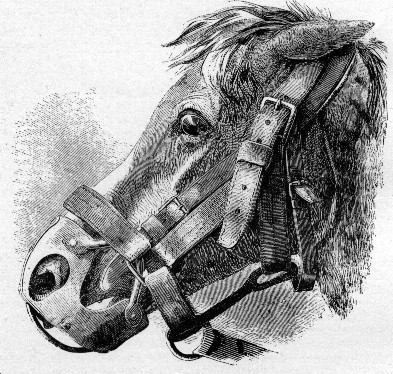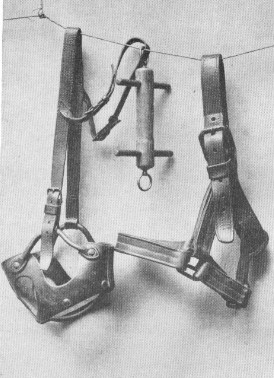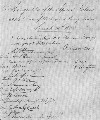"If Mr. Rarey would set criticism at naught," wrote Lord Dorchester, "let him come down to Murrell's Green with a few of his aristocratic friends and try Cruiser. If he can ride him as a hack, I guarantee him immortality and an amount of ready money that would make a British bank director's mouth water."That was a challenge, indeed!
 |
Cruiser, sired by Venison, dammed by Little Red Rover, was bred by Lord Dorchester in 1852, and from a foal had been considered vicious; he was always troublesome to handle, and showed temper on every opportunity. On the road from Danebury to Greaywell, he went on his knees and tore the ground up with his teeth. Dorchester had seen him lean against the wall of his box and kick and scream for ten minutes together.
For days he would allow no one to enter his box and, on one occasion tore an iron bar, one inch thick, in two with his teeth. But he was of great racing stock and had himself made one appearance, as a two-year-old, at Newmarket, when he was beaten a neck, after a close finish, by the Duke of Bedford's Para. In consequence of going amiss, Cruiser never started again, but at the time of the challenge, six colts and seven fillies were to his credit. However, he was the torment and menace of all who had him in charge, and his value had depreciated from $15,000 to $10,000; it had even been proposed, for the safety of his keepers to deprive him of his sight. At Rawcliffe, he was always exhibited by a groom with a bludgeon in his hand, and few were bold enough to venture into his yard, the cordial wish of every visitor apparently being that some friendly bullet would lay him low.
Mr. Rarey promptly accepted the challenge and asked that Cruiser be sent to him in London, but Lord Dorchester replied that Mr. Rarey must come to the horse. So it was done, Mr. Rarey finding Cruiser a prisoner in a brick stable with a solid oak door. For three years the horse had worn an eight-pound muzzle of iron with a bar in front of his mouth so that he could eat only by licking the feed up with his tongue. The quarters were cramped for successful operation but the situation had to be accepted and, accompanied by Lords Dorchester and Burleigh, Mr. Rarey set about the task which was to make or mar his English fame.
 |
Twice Cruiser flew at the trainer with a fierce bellow, but the latter escaped only to return to the attack and at length succeeded in tying Cruiser's head to the rack. This sense of restraint maddened the horse, the blood vessels of his head, dilated and his frenzy for nearly twenty minutes was such that Lord Dorchester begged Mr. Rarey not to peril his life and to think no more of the one hundred pound bond which he had entered into to return the horse cured in three months. But Mr. Rarey knew the game better than did either Dorchester or the horse. Gradually the latter's fury was spent and the way was opened to other proofs to the animal that he had met his master.
At the end of three hours Cruiser bore Lord Dorchester up and down the straw yard, as he had previously borne Mr. Rarey. Later, he trotted, led behind a cart, to Virginia Water for the night. The next day, Cruiser was led to London behind an open buggy, where he became the chief exhibit in proof of the trainer's prowess. Queen Victoria was delighted and she and the royal children were frequent visitors, caressing Cruiser in regret for the hard usage to which he had been subjected. Four times she witnessed exhibitions by Mr. Rarey, asserting that for her there could be no better amusement.
Now began a period of triumph for the American. A class of two thousand persons was
formed, headed by the Queen and the Prince Consort and including princes, dukes, earls,
duchesses, marchionesses and other representatives of the nobility, each subscriber paying
a fee of $52.50. Mr. Rarey's popularity ran high, due not only to his marvelous successes
but also to his quiet, gentlemanly deportment and unassuming manners. Verses and music
were composed and dedicated to him. There was the Rarey Waltz, written by his
highly gratified pupil, Matilda Langen and played at Her Majesty's state ball by Mr.
Weippert's band.
One of the literary tributes follows:
